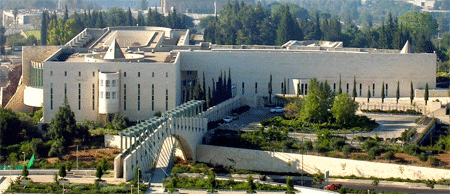In an unusual move, Israel’s High Court of Justice froze a Sharia Court ruling granting custody of two children to their father, and delayed further discussion of the case in the Sharia Appeals Court.
The ruling came in response to a petition filed by a single mother against the Sharia Court in Jaffa that granted custody of her two young children to her ex-partner.
The ruling is distinctive, because the Israeli High Court of Justice usually does not interfere in religious court rulings even though it has the authority to do so.
The case also highlights the issues arising from the often inconsistent approach between Israel’s dual system of religious courts and family courts for dealing with certain matters of family law, in this case visitation and custody rights of children.
WHY ISRAEL HAS A PUBLICLY-FUNDED SYSTEM OF SHARIA COURTS
While many people outside of Israel have read about the Jewish Rabbinical court system — mostly in connection with problems with its marriage and divorce laws, which have been criticized for widely favoring men, whereas the family court system has been criticized for favoring women — it is less widely known that Israel also has a publicly-funded Sharia court system for its Muslim citizens.
While Israel’s system of civil and labor courts is similar to that of other countries, Israel is unique in that it retains a system of religious courts, which deal mainly with matters relating to family law.
The system is a legacy of pre-State law: the State of Israel has left the pre-existing law of family relations virtually untouched from the Ottoman and then the British Mandate periods.
For this reason, religious law applies as a source of law in matters relating to marriage and divorce, litigated before religious courts, though such application is subject to the law of the land and to the supervision of Israel’s Supreme Court. Israel
The law relating to religious courts is the 1922 Palestine Order in Council, which recognized eleven religious communities: Jewish, Muslim, and nine Christian denominations. The Israeli government added the Presbyterian Evangelical Church and the Ba’hai to this list. The Knesset also enacted a law vesting jurisdiction in the Druze religious courts.
“SHARIA COURTS VIOLATED THE PETITIONER’S RIGHTS”
The High Court petition, filed on the single mother’s behalf by the Legal Aid Department of the Justice Ministry, argued that the Sharia Court rulings went against rulings made by civil District and Family Courts regarding the couple’s two children.
The petitioner is a single mother who is classified as having no religion, while the father is a Lebanese citizen and a Muslim. According to the court documents, the two met in 1999 and had two children, now aged 13 and 9. The petitioner left the apartment she shared with her partner and her children, claiming that her partner had subjected her to severe physical violence. Since that date the parties live separately, and the children remained with their mother. The two children attended secular schools in the center of Israel.
The problems arose when the two parents began separate proceedings, the mother in the civil courts and the father in the Sharia Court system.
In 2008, the mother filed a case with a family court in Krayot, asking for legal custody of the children and for the father to contribute child support. The custody case went on for several years, during which the mother was given temporary custody of the children.
During the proceedings, the court found that the father had failed to comply with various judgements, including that he had failed to pay child support, so the civil Family Court froze his visitation rights until he complied. At this stage, the father opened separate proceedings over custody and visitation rights in the Jaffa Sharia court. Among other things, the father argued that the children should be transferred to Islamic schools and that their mother was in fact a Muslim.
LEGAL TANGLE
The result was a legal tangle, in which the rulings of the civil courts and Sharia courts contradicted each other, and rulings from each were not complied with. The Sharia Court system insisted that its authority took precedent over the authority of the Family Court on matters of custody and visitation rights. When the mother appealed to the Haifa District Court, the judge ruled that custody matters should be ruled on by the Family Courts; however, since the Sharia Court had already made a ruling, the District Court said the mother should appeal to the High Court of Justice.
In her High Court petition, the mother asked the court to overturn all the Sharia Court rulings.
Attorney Orna Paz, representing the mother in the High Court appeal, said the woman had suffered greatly because of the tangle between the Sharia Court and Family Court systems.
“I regret to say that the decisions of Sharia courts is unreasonable in the extreme, and contrary to the case law on this matter,” Paz said in a statement, adding that the case was “exceptional” and that the Sharia court had overstepped its authority.

